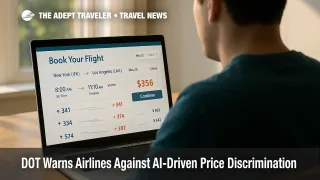DOT Warns Airlines Against AI-Driven Price Discrimination

Delta's experimental pricing algorithm faces fresh scrutiny after Transportation Secretary Sean Duffy vowed to investigate any carrier that individualizes fares based on personal data. The move follows congressional pressure and mounting consumer concern about AI-generated ticket prices.
Key Points
- Why it matters: DOT signals zero tolerance for discriminatory airfare algorithms.
- Travel impact: 3 % of Delta's domestic seats already priced by Fetcherr, with plans for 20 % by December 2025.
- What's next: Possible formal rule-making or DOT investigations if airlines pursue personalized pricing.
Snapshot
At an August 5 press conference, Secretary Duffy said the Department of Transportation will "investigate if anyone" tailors prices to a traveler's income, browsing history, or profile. He accepted Delta's assurance that its AI pricing tool, supplied by Israeli startup Fetcherr, does not use personal data, yet warned carriers to "sell seats for what they should go for." The statement comes less than two weeks after senators Mark Warner, Richard Blumenthal, and Ruben Gallego demanded clarity on Delta's AI strategy, citing president Glen Hauenstein's comment about "a price ... to the individual."
Background
Delta began live-testing Fetcherr's AI in April, now covering about 3 % of domestic inventory with ambitions for 20 % by year-end. Critics argue opaque algorithms could quietly raise fares on price-insensitive customers. Delta maintains the system "recommends adjustments up or down" and uses anonymized data only.
The Adept Traveler has tracked the debate since July 24, when American Airlines distanced itself from AI-driven personalization, and August 2, when Delta faced bipartisan backlash over the same tool. Both stories remain available for deeper context at our earlier coverage.
Latest Developments
DOT stakes out enforcement stance
Speaking to reporters in Washington, Duffy drew a line between dynamic pricing and individualized fares. "To try to individualize pricing on seats based on how much you make or don't make or who you are, I can guarantee we would investigate," he said. The secretary's comments echo rising political unease over AI opacity and come amid White House discussions on algorithmic transparency legislation. A Travel Weekly report quotes Duffy accepting Delta's clarification while promising scrutiny if evidence of discrimination emerges. Travel Weekly
Carriers defend dynamic models, eye regulation
Delta chief external affairs officer Peter Carter reiterated in a letter to senators that "there is no fare product" targeting individuals, framing Fetcherr as a revenue-optimization aid. Rival airlines similarly insist current revenue-management tools rely on demand curves, not personal dossiers, though several carriers privately acknowledge monitoring AI pilots. Consumer advocates counter that existing privacy laws may not pre-empt a future shift toward granular targeting, urging DOT to issue binding guidance. Industry analysts expect a formal notice-and-comment process if Duffy's rhetoric hardens into rule-making.
Analysis
Duffy's warning marks the strongest federal signal yet that personalized airfare pricing sits outside the political Overton window. Airlines have long practiced segmented pricing-sale fares, corporate contracts, loyalty discounts-without triggering antitrust alarms. AI, however, promises near-real-time pattern recognition that can infer a traveler's willingness to pay from digital exhaust. Even if Fetcherr currently ingests only anonymized booking data, the tool's capabilities will expand as machine-learning models seek marginal gains.
Regulators face three challenges. First, proving discrimination requires forensic access to proprietary code and data streams. Second, existing statutes cover overt factors such as race or disability but not wealth proxies like device type or purchase history. Third, airlines argue that personalized offers could also lower prices for low-income travelers, complicating consumer-welfare calculus.
For carriers, the reputational risk already outweighs incremental revenue. Delta's swift public defense and American's earlier distancing reflect a calculation that transparency trumps quiet experimentation. Yet competitive pressure may revive the debate if one airline demonstrates sustained profit lift. A clear DOT framework-defining acceptable inputs and mandatory disclosures-would give airlines a roadmap for innovation while safeguarding passengers. The coming months will reveal whether Duffy's remarks catalyze formal regulation or remain a deterrent delivered from the bully pulpit.
Final Thoughts
Price optimization is as old as commercial aviation, but AI's ability to parse hidden consumer signals pushes the practice toward airline price discrimination territory. Until regulators codify limits, transparency and public trust will determine how far carriers dare to go with any AI pricing tool.
Sources
- Transportation secretary warns airlines against price discrimination, Travel Weekly
- Delta gets blowback for using AI to set airfares, Wall Street Journal
- Delta responds to AI pricing controversy, Travel Weekly
- Delta's AI pricing plan sparks alarm from senators, Axios
- Delta Air Lines responds to concerns over AI pricing practices, TravelPulse
